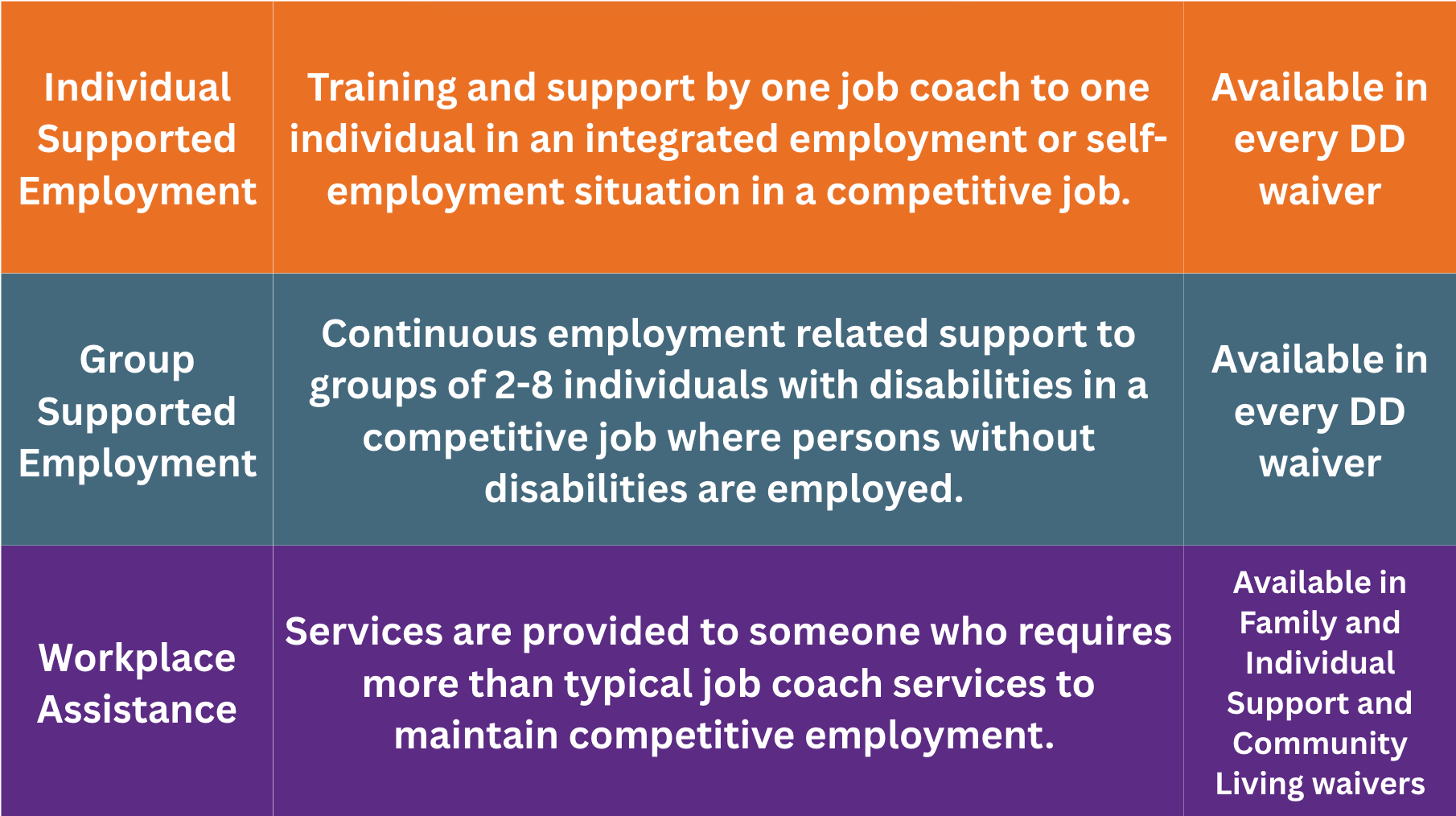Employment
Getting a job is often the key to many people's independence. It is where people earn money they can use to pay rent, for food they enjoy, buy birthday presents for loved ones, or take their partner on a date. Getting a competitive job that pays a fair wage and gives someone a sense of purpose can feel impossible. Maybe people have told you you cannot work - maybe you are worried about losing your Social Security or Medicaid - maybe you just do not know where to start. We want you to know that work is possible, and there are programs to support you!
DARS Consumer Vocational Rehabilitation (VR)
VR is for Virginians (and soon-to-be Virginians) who are at least 14 with a disability that keeps them from being able to get and keep a job. If that sounds like you, take the following steps to get set up and start using VR services:
- Contact your local DARS office to set up an appointment with a vocational rehabilitation counselor. When you contact the office, ask them what documents and information you should bring (think about bringing an Individual Education Plan, transition plan, any therapeutic evaluations, or medical documentation of your disability).
- Meet with your counselor to talk about if you are eligible for services. Your counselor may ask you to get updated/new evaluations, which you will not have to pay for.
- If you are eligible for VR services, you and your counselor will talk about your goals, do any skills or on-the-job testing, figure out if there are any additional supports (like college financial aid or employer workplace accommodations), and create and sign an employment plan.
- Your Employment Plan documents your job goal, services, service providers, dates, estimated cost, funding sources, and progress review dates. You must review the plan at least once a year.
- Start your job search. Your counselor does not find you a job, but they can help you work on job-search skills, interview skills, and on-the-job training.
After about 90 days, if you are still employed and enjoying your job, your VR counselor may close your case. You can ask to re-open it and continue getting services, but you may need to reapply.

DARS Appeals
You have the right to disagree with and appeal decisions DARS or your counselor makes, and you do so by:
- Meet with the counselor's supervisor
- Ask the counselor's supervisor to conduct an informal administrative review
- Ask for assistance from the Client Assistance Program offered through the disAbility Law Center of Virginia at 1 (800) 552-3962.
- Meet with the DRS District Manager
- Ask the DRS District Manager for formal mediation facilitated by Supreme Court of Virginia mediator
- I have the right to proceed directly to a hearing conducted by an impartial hearing officer. My counselor can help me with the request.

DD Waiver Employment Services
The Developmental Disability waivers have a number of employment or day support services. The three services specific to employment are Individual Supported Employment, Group Supported Employment, and Workplace Assistance.
Work with your or support coordinator to add employment supports to the services you want to use with your waiver.
Working and Earning on Social Security and Medicaid
This is always a topic that makes some folks nervous. People do not want to work because they do not want to lose their Social Security or Medicaid benefits. Some Medicaid services that keep people healthy, or even help a person keep their job, are typically not available through private employer insurance. Keeping your benefits after getting a job can be really important and
possible!
Work Incentives Planning and Assistance (WIPA)
Work incentives are the term the Social Security Administration uses to describe programs that help people get benefits while working and keep some benefits. WIPA is for anyone getting SSI or SSDI and is currently working or about to start a job. WIPA staff offer expert and individualized guidance.
You can find a local WIPA benefits counselor by clicking here, choosing "Benefits Counseling (WIPA)," and entering your zip code.
You can also call the Ticket to Work Help Line at 1-866-968-7842 or 1-866-833-2967 (TTY), Monday through Friday from 8 a.m. - 8 p.m. ET

List of SSDI and SSI Work Incentives
SSDI and SSI Incentives
Impairment-Related Work Expenses (IRWE): You can deduct costs for disability-related items or services needed for work (like assistive devices or transportation) from your earnings when SSA evaluates your work activity. This helps reduce countable income, making it easier to qualify for or maintain benefits.
Subsidies and Special Conditions: If you receive extra support at work (like a job coach or modified duties), SSA may reduce the value of your earnings when determining if you're engaging in substantial gainful activity (SGA). This can help you continue receiving benefits while working.
Unsuccessful Work Attempt (UWA): If you try working but stop within six months due to your disability or loss of supports, SSA may not count that work attempt against you. This protects your benefits during short-term work efforts that don't succeed.
Social Security
Expedited Reinstatement (EXR): If your benefits stopped because of work and you can't continue working due to your disability, you can request to have your benefits restarted without a new application. While SSA reviews your request, you may receive temporary benefits for up to six months.
Continued Payment Under a Vocational Rehabilitation or Similar Program (Section 301): If you're participating in an approved vocational rehabilitation program when your medical condition improves, SSA may continue your benefits until the program ends or you achieve employment. This encourages continued participation in programs that help you return to work.
SSDI-Only Incentives
Trial Work Period (TWP): You can test your ability to work for at least nine months while still receiving full SSDI benefits, regardless of how much you earn. This allows you to try working without immediately losing benefits.
Extended Period of Eligibility (EPE): After the TWP, you have a 36-month window where you can receive SSDI benefits for any month your earnings fall below the SGA level, without needing a new application. This provides a safety net as you transition back to work.
Continuation of Medicare Coverage: Even if your SSDI payments stop due to work, you can often keep your Medicare coverage for at least 93 months after the TWP. This ensures continued access to healthcare as you work.
Medicare for People with Disabilities Who Work: After premium-free Medicare ends, you can purchase Medicare Part A by paying a premium, allowing you to maintain healthcare coverage while working.
SSI-Only Incentives
Earned Income Exclusion: SSA doesn't count the first $65 of your monthly earnings, plus half of the remaining earnings, when calculating your SSI payment. This means you can work and still receive SSI benefits.
Student Earned Income Exclusion (SEIE): If you're under 22 and regularly attending school, SSA may exclude a certain amount of your earnings from SSI calculations. This encourages students with disabilities to work while studying.
Blind Work Expenses (BWE): If you're blind, SSA excludes any work-related expenses from your earnings when calculating SSI payments, regardless of whether the expenses are related to your blindness. This allows more flexibility in working without reducing benefits.
Plan to Achieve Self-Support (PASS): You can set aside income or resources to pay for items or services needed to achieve a work goal, and SSA won't count them when determining SSI eligibility or payment amount. This helps you invest in your future employment.
Property Essential to Self-Support (PESS): SSA doesn't count certain property you need for work (like tools or equipment) when determining SSI eligibility. This allows you to maintain necessary resources for employment.
Special SSI Payments for People Who Work – Section 1619(a): If your earnings are too high for regular SSI but not enough to replace SSI benefits, you may still receive SSI payments under Section 1619(a). This supports continued work without losing all benefits.
Reinstating Eligibility Without a New Application: If you become ineligible for SSI due to earnings but stop working within 12 months, you can request to have your benefits reinstated without a new application. This provides a quick return to benefits if work doesn't pan out.
Medicaid Works
This is also known as Medicaid Buy-In. Medicaid Works helps Virginians with disabilities work and keep important Medicaid services.
People in Medicaid Works can earn up to $75,000 and save up to $59,755 (effective January 1, 2025) of their earnings. MEDICAID WORKS is available to current and new Medicaid enrollees who are blind or disabled, have total countable income of no more than $1,801 per month for an individual or $2,434 for a couple and resources of no more than $2,000 if single ($3,000 if a couple).

